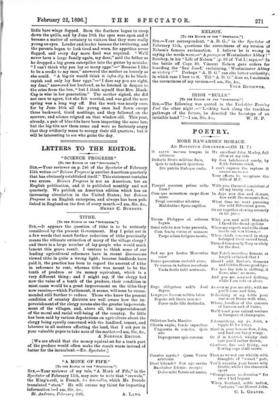TITHE.
rTo THE EDITOR OF THE usrsomerea."i SIR,—It appears the question of tithe is to be seriously considered by the present Government. May I point out in a few words that much further reduction of tithe practically means the ultimate extinction of many of the village clergy ? and there is a large number of lay-people who would much lament this grave result. I venture to think some of our leading agricultural reformers have in recent discussions viewed tithe in quite a wrong light; because landlords have paid it, the practice has been to regard the amount of tithe in reference to rent, whereas tithe was meant to be the tenth of produce or its money equivalent, which is a very different thing ; and I might say, if the clergy had now the value of a tenth of the produce, their condition in most cases would be a great improvement on the tithe they now receive,—which Parliament, it seems, will soon be recom- mended still further to reduce. Those who know the present condition of country districts are well aware how the im- poverishment of the clergy means also the greater impoverish- ment of the villages, and, above all, the impoverishment of the moral and racial well-being of the country. So little has been said by various deputations on agriculture about the clergy being equally concerned with the landlord, tenant, and labourer in all matters affecting the land, that I ask you in your valuable paper to take note of the matter.—I am, Sir, Jcc., A NORFOLK RECTOR.
[We are afraid that the money equivalent for a tenth part of the produce would often make the result worse instead of better for the incumbent.—En. Spectator.]


































 Previous page
Previous page